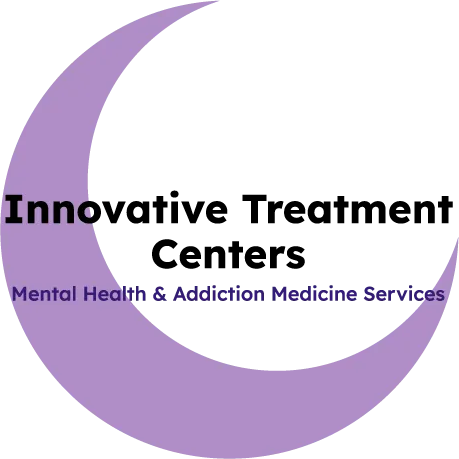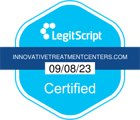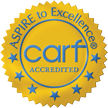Diagnostic assessments
Psychiatric Assessment at Innovative Treatment Centers
Our psychiatric assessments help diagnose emotional, developmental, and behavioral conditions, guiding personalized treatment plans that may include therapy, medication management, genetic testing, and psychosocial review.
We also conduct psychological evaluations required for bariatric surgery, spinal cord and peripheral nerve stimulators, and other procedures that necessitate psychiatric clearance.
We treat a wide range of conditions, including:
- Depression and mood disorders
- Anxiety and obsessive-compulsive disorders
- ADHD and neurodevelopmental disorders
- Bipolar disorder
- PTSD and trauma-related conditions
- Substance use and addictive disorders
- Sexual and gender-related issues
- Psychotic disorders
At Innovative Treatment Centers, we provide a safe, affirming, and inclusive environment. Our team is kink-affirming and LGBTQ+ allied, committed to individualized, stigma-free care that empowers each person on their path to wellness.
Therapy
Therapy & Counseling at Innovative Treatment Centers
At Innovative Treatment Centers, we offer personalized psychotherapy and counseling to help individuals navigate emotional challenges, mental health conditions, and life transitions. Whether you’re dealing with anxiety, trauma, relationship issues, or chronic pain, our licensed therapists use evidence-based approaches tailored to your needs.
Our team incorporates a wide range of therapeutic modalities, including:
- Cognitive Behavioral Therapy (CBT)
- Dialectical Behavior Therapy (DBT)
- Motivational Interviewing
- Grief Counseling
- Somatic Tracking
- Humanistic Therapy
- Eye Movement Desensitization and Reprocessing (EMDR)
- Clinical Hypnotherapy
- Pain Reprocessing Therapy (PRT)
Special Focus: Chronic Pain & the Mind-Body Connection
Many chronic pain conditions like fibromyalgia, headaches, back or neck pain, and repetitive strain injuries are linked to neuroplastic (brain-generated) processes rather than structural damage. Pain Reprocessing Therapy helps retrain the brain to interpret signals accurately, breaking the cycle of false pain alarms and restoring well-being.
We believe in whole-person healing—combining neuroscience, compassion, and innovation to help you move forward.
Spravato Treatment
Spravato® (esketamine) Now Available at ITC
A New Hope for Treatment-Resistant Depression
At Innovative Treatment Centers, we’re proud to offer Spravato® (esketamine)—a groundbreaking FDA-approved treatment designed for adults struggling with treatment-resistant depression (TRD) and major depressive disorder (MDD) with suicidal thoughts or behavior.
Spravato represents a transformative option for individuals who have not found relief through traditional antidepressants. Administered as a nasal spray under medical supervision, Spravato works differently from oral antidepressants by targeting the NMDA receptor in the brain, helping to rapidly reduce symptoms of depression—sometimes within hours or days.
Why Choose Spravato at ITC?
- Clinically proven relief for patients with TRD and MDD with acute symptoms
- FDA-approved and covered by most major insurance plans
- Delivered in a safe, comfortable, and monitored clinical setting
- Administered by a team of compassionate, experienced psychiatric professionals
- Tailored treatment plans designed around your unique needs and goals
Spravato Right for You?
You may be a candidate for Spravato if:
- You’ve tried two or more antidepressants without success
- You’re experiencing persistent depressive symptoms despite treatment
- You’ve been diagnosed with major depressive disorder with acute suicidal ideation
At ITC, we conduct a comprehensive psychiatric assessment and coordinate with your current providers to determine if Spravato is the right path forward.
Let’s find a new path together.
Contact us today
to schedule your consultation and learn more about how Spravato can help restore hope, connection, and wellness.
Addiction medicine
Regain Control. Reclaim Your Life.
At Innovative Treatment Centers, we believe recovery is possible—and personal. Our team of dedicated practitioners partners with you to help overcome substance use, restore your health, and reclaim your future. We provide compassionate, nonjudgmental care grounded in evidence-based practices and tailored to your individual journey.
Medication-Assisted Treatment That Works
We specialize in Medications for Opioid Use Disorder (MOUD)—a clinically proven approach that combines FDA-approved medications with counseling and behavioral therapies to support lasting recovery.
While we do not prescribe methadone, we offer a full range of effective alternatives, including:
- Suboxone® (buprenorphine/naloxone)
- Sublocade® (extended-release buprenorphine injection)
- Brixadi® (weekly or monthly buprenorphine injection)
- Vivitrol® (extended-release naltrexone injection)
These medications target brain receptors involved in addiction, helping to reduce cravings, minimize withdrawal symptoms, and lower the risk of relapse or overdose. When combined with psychosocial support, relapse rates can drop by 50% at one year.
Comprehensive Treatment for Substance Use Disorders
Our programs are designed to treat the whole person—not just the symptoms—through a blend of medication management, therapy, life skills development, and community support. We walk alongside you every step of the way.
Conditions We Treat:
- Opioid Use Disorder (including heroin, fentanyl, and prescription opioids)
- Alcohol Use Disorder
- Sedative-Hypnotic Use Disorder (benzodiazepines)
- Stimulant Use Disorder
- Cannabis Use Disorder
We also provide Hepatitis C screening and treatment, ensuring that physical health is addressed alongside mental and emotional well-being.
Case management
The Power of Case Management at ITC: Guiding Clients Toward Holistic Healing
At Innovative Treatment Centers (ITC), we recognize that mental health and recovery are not achieved in isolation. Many of our clients face complex challenges—emotional, social, medical, and environmental—that can hinder progress if left unaddressed. That’s where case management comes in. Case management is the bridge between clinical treatment and everyday life. It is the supportive thread that weaves together care coordination, psychosocial support, advocacy, and long-term planning. At ITC, our case managers work one-on-one with clients to help them navigate systems, access critical resources, and achieve goals that foster stability, self-worth, and wellness.
Psychosocial Support That Transforms Lives
Case managers at ITC assess the whole person, not just a diagnosis. They evaluate a client’s psychosocial needs—housing, employment, education, family dynamics, legal issues, transportation, and more. These factors often influence mental health just as much as medications or therapy. Our team helps clients overcome these barriers by connecting them with community programs, social services, and internal supports within ITC.
Whether it's helping a client apply for health insurance, find safe housing, attend a job interview, or reunite with family, our case managers ensure that no one walks this journey alone.
What Case Managers Do at ITC:
- Develop individualized care plans tailored to client goals
- Coordinate services among therapists, psychiatric providers, and external partners
- Assist with Medicaid/Medicare applications, transportation, and legal referrals
- Provide crisis intervention and emotional support
- Facilitate access to housing, employment training, food assistance, and education programs
- Advocate for client needs across healthcare and social systems
- Support transitions between levels of care (e.g., inpatient to outpatient)
A Collaborative, Compassionate Approach
At ITC, case management is not a side service—it is a core part of our integrated model. Our case managers collaborate closely with therapists, psychiatric providers, and families to ensure that care is seamless, culturally competent, and aligned with the client’s values.
When clients feel supported in every dimension of life, they heal faster, stay engaged in care longer, and achieve better outcomes. Case management at ITC empowers clients to become the authors of their own recovery stories—with dignity, resilience, and hope.
ADHD assessments
Unlock Focus. Empower Growth.
ADHD Assessments at Innovative Treatment Centers
At Innovative Treatment Centers (ITC), we take a comprehensive and compassionate approach to assessing Attention-Deficit/Hyperactivity Disorder (ADHD) in children, adolescents, and adults. Our goal is not just a diagnosis—but understanding the why behind attention struggles, impulsivity, disorganization, and emotional regulation challenges.
We recognize that ADHD doesn’t look the same in every person, which is why we offer evidence-based, personalized assessments that combine science, lived experience, and family insights.
What Makes Our ADHD Assessments Different?
Cognitive Performance Testing
Using advanced, research-backed tools, we objectively measure attention span, impulse control, processing speed, memory, and executive functioning. These performance-based tests help identify patterns that may not be captured through interviews alone.
Comprehensive Psychiatric Evaluation
Our experienced psychiatric providers conduct in-depth assessments that explore medical history, mood, anxiety, trauma, substance use, and co-occurring conditions that may impact attention and behavior. We tailor each assessment to reflect your unique life story.
Psychological Evaluation
We go beyond surface symptoms. Our psychological evaluation delves into emotional well-being, personality structure, and learning styles to better understand how ADHD may be affecting academic, occupational, and relational functioning.
Family Collaboration
At ITC, you’re not alone. We actively involve parents, caregivers, and partners throughout the process—because their observations and insights are essential. Together, we co-create a plan that empowers growth, resilience, and connection.
Whether you’re a parent seeking answers for your child, a college student struggling to stay organized, or an adult wondering if ADHD has been overlooked—we’re here to help.
Let’s uncover the full picture. Let’s focus forward—together.
Now accepting referrals and self-scheduled evaluations. | Call us or book online today to get started.



